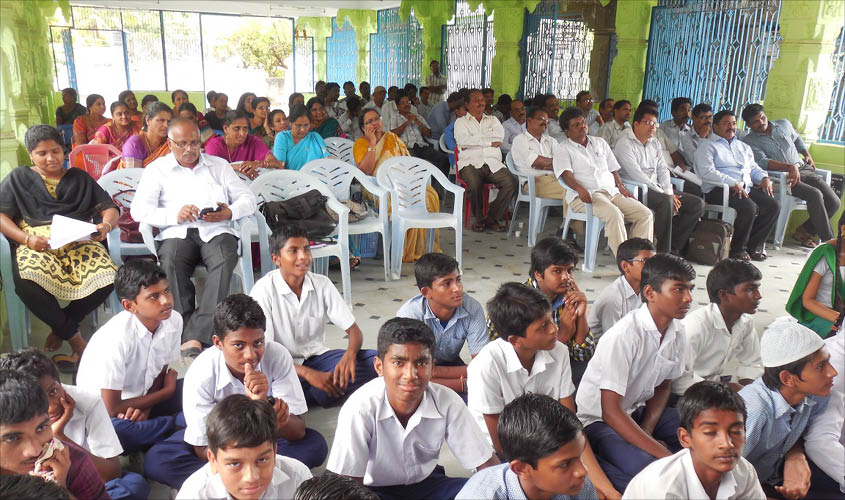Linguistic experts, journalists and professors are unhappy with the amendment introduced to the New Education Policy (NEP) 2019 draft, wherein the Ministry of Human Resource Development (MHRD) dropped the clause on compulsory learning of Hindi from the language section and did away with phrases like “non-Hindi speaking states”.
The draft NEP 2019 got into controversy since the day it became public, especially over the three-language policy recommended by the drafting committee. As the matter snowballed into a controvery, the NEP 2019 panel decided to revise the draft and remove the clause that offended many, especially in Tamil Nadu.
However, the chairperson of the drafting committee, former ISRO chief Dr K. Kasturirangan, has publicly stated: “The committee was not intended to impose Hindi or send any such expression, and that the clause had been misread.”
Speaking on the issue, noted journalist and language activist Rahul Dev said: “The tragedy is that people haven’t read the NEP draft; if people from Tamil Nadu and all those who are opposing it had read the basic draft, they would have found how the NEP would have meant creation of a few lakh teachers’ jobs in all the languages proposed in the NEP.”
“The NEP 2019 has tried to fix the weakness of the existing three-language formula. Earlier, the Hindi states used to take advantage of the loopholes and apart from studying Hindi and English, students opted for Sanskrit or Urdu as their third language, instead of studying any South Indian languages. But the current draft explicitly stated that the Hindi states have been lax in implementing the three-language formula. This time, the draft proposed that Hindi speaking states too will have to study a third language—a modern Indian state language. That means the third language can’t be Sanskrit. The proposed policy will push students to choose languages including Tamil, Malayali, Bengali, Marathi and Gujarati or any other such language,” Dev said.
“So far as Hindi in Tamil Nadu is concerned, this was already a demand from the students of the state. Five years ago, in a TV programme, some English speaking students and teachers said that they wanted to study Hindi as it would help them in getting jobs. The draft NEP 2019 has given much stress on mother tongue-based education. Also, the NEP had taken a fresh look at the challenges ahead for the country’s education system. I am very happy with the NEP draft,” Dev said.
Asked whether the quick response from the Centre came due to BJP’s political ambitions in Tamil Nadu, Dev said: “They (the MHRD) got afraid. They should have waited as it was just a draft. They should have taken the opposing views into consideration; there was no need for a hurried response.”
There are other experts who don’t see NEP 2019 pushing Hindi. Makrand R. Paranjape, a professor and poet, said: “The greatest Hindu mass leaders, Sri Sri Ravi Shankar and Sadhguru Jaggi Vasudev are Tamilians who speak to large audiences in Hindi. In Tamil Nadu, people spontaneously talk to me in Hindi. I am repeatedly told that by not learning Hindi, Tamil youths can’t get jobs outside the state.”
Some experts said that the controversy on the three-language formula was unnecessary as the same formula has been there since the first NEP which came in 1968. The same provision was reiterated by the National Policy on Education in 1986 (revised in 1992) and the NEP 2019 has just extended the existing device.
Pravesh Kumar, who teaches at the Jawaharlal Nehru University, said: “There is nothing wrong in pushing Hindi as a third language as it has played a role in connecting people. The best way to educate our children is to give them education in their mother tongue or in a larger connecting language.” “Apprehensions about Hindi have been falsely created by a few English speaking elites. On the ground, if you go to Tamil Nadu, you would see people fluently speaking in Hindi. Hindi has its own market and if the new breed wants jobs, they will have to embrace Hindi as their own language,” Kumar said.
On the other hand, there are a few experts who said that the BJP’s politics and slogans of the RSS have created doubts and fear about language imposition in the minds of people.
Apoorvanand, professor in the Hindi Department of the University of Delhi, told The Sunday Guardian: “The BJP has been known as a party of the Hindi heartland. The BJP’s ideological partner RSS has already adopted the slogan ‘one nation, one flag and one language’ and this has created a fear psychosis even if the party is not directly promoting language imposition. During its last stint, the BJP-led Central government introduced numeric on currency in Devnagri script and these steps have made people think that the BJP-led Central government is determined to impose the dominant North-Indian political narrative through language dominance.”
Apporvanand added: “In my view, the NEP 2019 is sloppy and tries to please every stakeholder. It has not offered anything new—not even the three language formula.”

